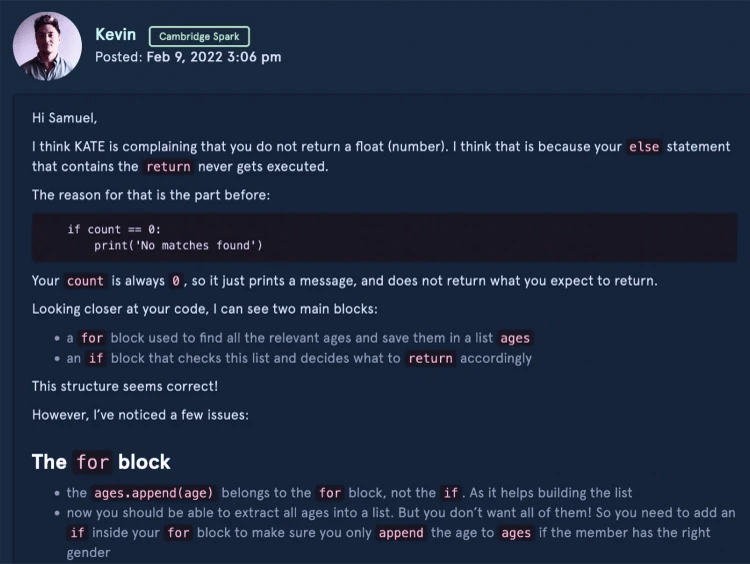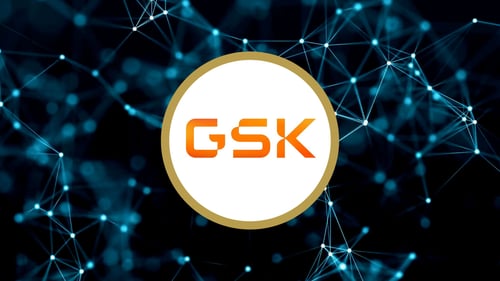

Level 5 Data Engineer Apprenticeship
Interested in joining our next programme?
Enrolment deadline
25th October 2024
.png)
One data apprentice can create real business impact
£1.4m revenue
identified through data-driven insights
£120,000 saved
by creating efficiencies
90% shorter project times
achieved through automations
5x faster ML model training
achieved through automations
Build capability to create and maintain key data infrastructure
Want to train new talent and reskill existing employees with one of the most in-demand technical skillsets? Develop key internal capabilities to raise the usability of critical datasets in your organisation. Cambridge Spark's Level 5 Data Engineer Apprenticeship equips learners with core technical and leadership skills.
In turn, learners are able to support business functions in creating and maintaining data analytics pipelines. They build the skillset to access data in their organisation and gain an understanding of the data engineering lifecycle, data modelling and more to help organisations maximise the value of their data.
Leaners will also have the opportunity to join guest talks on technical updates from leading technology providers like Google Cloud Platform and Databricks.
Hear from Jonathan Wagstaff, Group Head of Business Intelligence at Exertis

.png)
Hear from Jonathan Wagstaff, Group Head of Business Intelligence at Exertis

Jonathan Wagstaff
Data apprenticeships enable myself and my team to keep up-to-date with the latest.
Eligibility
Suitability of role
- Looking to develop skills in Python, SQL, data modelling approaches, software testing, git, CI/CD and DevOps mindset
- Pursuing a junior data engineering role
Eligibility for funding
- No prior equivalent data training or related experience.
- Employed in England and resident in the UK or EEA for the last 3 years.
- Employees working at least 30 hours a week (part-time employees can be considered for a minimum cohort size)
- Can commit to the minimum 6 hours a week on the job learning requirement for the duration of the programme (14 months of training)

What makes our programme special
We deliver all of our programmes online, helping our clients offer flexible and inclusive programmes open to all of their staff. EDUKATE.AI, our online learning platform, gives learners a sandbox environment to practice their skills, providing them with immediate feedback on industry-simulated assignments. We believe that the gold standard for online delivery is to offer a mix of experiential learning, coaching, technical mentorship and peer support.

Real-World Practice for Accelerated Impact

EDUKATE.AI

Expert Curriculum

Personalised Learner Support

Flexible Fully Online Learning

Community
%20(2).png)
%20(2).png)

A real-world learning experience

The Curriculum
Our curriculum is developed by our leading faculty, composed of data scientists in leading industry positions and academics from some of the top universities in the world. Our curriculum is continuously updated and reiterated to incorporate the latest skills.
We take a modular approach to how we offer our curriculum. The full Level 5 Data Engineer Apprenticeship includes all of the below modules. We also offer curated shorter tracks and can offer a fully tailored pathway based on a skills gap analysis.
Core Modules
Learn more about what is meant by data engineering and how it is used in organisations.
Gain insights into the diverse roles that interact with data engineers and understand their collaborative interactions.
Learn the fundamentals of SQL, from connecting to SQLite databases and performing basic queries to advanced topics like subqueries, joins, and optimising queries with indexes.
Explore NoSQL databases, understand their pros and cons, and work with real-world examples, gaining practical experience with tools like DBeaver, SQLAlchemy, and BigQuery to connect and manipulate data in diverse SQL environments.
Explore the Software Development Lifecycle and Continuous Integration/Continuous Deployment processes, gaining an understanding of containerisation with an introduction to Docker.
Gain an understanding of deploying container-based applications using Kubernetes and learn Infrastructure as Code (IaaC) principles, implementing them with Terraform for efficient infrastructure management.
This module offers a comprehensive exploration of data quality, encompassing aspects such as accuracy, completeness, consistency, and timeliness.
It also addresses critical topics in data governance, including compliance with privacy and security regulations, ethical considerations, and the implementation of best practices to ensure data quality and ethical data handling while minimising environmental impact
This module introduces the essential concepts of data pipelines and workflow orchestration, followed by hands-on experience in building, monitoring, and scaling data pipelines using Python and tools like Airflow and Luigi.
It also covers configuring data access, managing permissions, incident management, and optimisation techniques to ensure efficient and reliable data processing within pipelines.
Understand real-time data streaming and advanced integration techniques, learning best practices for data security and access control.
Explore strategies for optimising performance and scalability in data engineering within a cloud computing environment while considering vendor-agnostic principles and evaluating various data storage and computing options.
Explore the latest trends and emerging technologies in data engineering, focusing on optimising data products and leveraging advancements in data science.
Learn strategies for ensuring business continuity through robust data provision, while emphasising the importance of continuous improvement to stay abreast of rapid technological developments.
FAQs
What delivery options do you offer?
We tailor our delivery to your workforce needs. This ranges from from independent, immersive elearning supported by EDUKATE.AI through to tailored bootcamps, to our structured apprenticeship programmes. The Level 5 Data Enginner Apprenticeship is available to learners based in England.
Are you able to tailor the programme to the organisation and sector?
Yes. We work with our clients to contextualise our programmes to their organisation and sectors they operate in. We do this through tailored hackathons, bespoke assignments and guest lectures from industry experts. We also work with a range of partners to create bespoke programmes for sector, such as health and journalism.
What is an apprenticeship?
Apprenticeships are a long-term training commitment which seek to support people entering the workforce and upskill existing UK-based employees within an organisation, enabling employers to foster a workforce consisting of highly-skilled and highly-engaged talent.
The Cambridge Spark Data Engineer Apprenticeship runs 14 months plus a 3-month end-point assessment and includes a minimum of 6 hours per week off-the-job training, enabling a blended approach between theory and practical-learning.
What is the Apprenticeship Levy?
The UK government introduced the Apprenticeship Levy scheme in April 2017 as a way to drive investment in strengthening the country’s skills base.
All organisations with annual staff costs of over £3m have to pay 0.5% of their salary bill into a ring-fenced apprenticeship levy pot. The money is collected monthly via PAYE and can only be used for training on approved apprenticeship schemes (such as the Level 5 Data Engineer Apprenticeship that we offer). Organisations must forfeit any levy funding left unspent for 24 months or more.
What if my organisation doesn't pay into the UK Apprenticeship Levy?
An organisation that doesn't pay into the levy can still qualify for government-funded apprenticeships for their staff. In fact, the UK government will sponsor 95% of the apprenticeship programme, leaving the organisation to invest the remaining 5%, provided that learners meet other eligibility criteria.
What does "off-the-job training" mean?
Off-the-job training is defined as learning undertaken outside of the day-to-day work duties and during the apprentice’s normal working hours.
Our off-the-job training is delivered on a flexible basis and can be carried out at the apprentice’s place of work or home.
The 6 hours per week, minimum, off-the-job training provides learners with the time to focus and develop the required skills, knowledge and behaviours to complete the programme.
How much do managers need to be involved?
Managers will need to ensure apprentices achieve their planned off-the-job training hours and work on their project portfolio.
We also encourage managers to have regular one-to-one meetings with apprentices to catch up on how they are progressing and to join the apprentice and their coach for 30 minutes every 3-4 months for a general catch up about the programme.
.png)
Who's benefitted from our data apprenticeships




